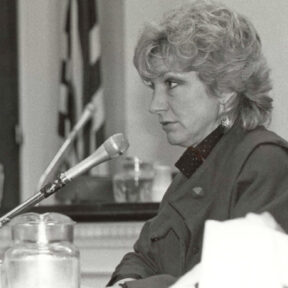
Karen Parker
Overview
* Human rights attorney
* Chief delegate for the Humanitarian Law Project
* Argued against the deportation of Salvadoran and Guatemalan illegal immigrants in the U.S.
* Defended the Whitewater figure Susan McDougal, whom she characterized as a victim of torture
* Stated that the fate of mankind depends upon the “true disarmament” of the U.S.
Karen Parker was born on August 12, 1949. She is an attorney based in San Francisco, who practices human rights and humanitarian law. She received her degree from the University of San Francisco Law School in 1983. According to her website, “she is responsible, in part, for the evolution of international law in such areas as economic sanctions, weaponry, environment as a human right, and the rights of the disabled. She also consults and serves as an expert witness in legal disputes involving the application of armed conflict law.” Parker testifies regularly at the U.N. Commission on Human Rights in Geneva. She is currently the chief delegate for International Educational Development – Humanitarian Law Project (HLP), a nongovernmental organization founded by billionaire financier Aris Anagnos. The HLP regularly condemns the United States, is a strong supporter of Marxist causes, and opposes the antiterrorism measure known as the Patriot Act.
During the civil war in El Salvador in the 1980s, Ms. Parker denounced the United States’alleged failure to respect the principle of non-refoulement, which forbids a nation to return refugees back to a country where human rights violations are taking place. In 1985, the HLP learned that one of the Salvadoran rebel commanders, Nidia Diaz, had been captured. Parker flew to El Salvador, negotiated her way into the prison, and visited Diaz, whom she found suffering from four bullet wounds. Shortly thereafter a Mexican surgeon operated on Diaz in an event that was widely publicized due to the operating room assistance of actor Mike Farrell.
Ms. Parker’s arguments on the application of the Geneva Convention and immigration laws were instrumental in preventing the deportation of illegal Salvadoran and Guatemalan immigrants from the United States. Moreover, her testimony helped acquit illegal laborers in New Mexico in a 1988 trial.
Also in 1988, before a scheduled human rights summit between U.S. and Soviet leaders, Parker led a press conference in New York to assure the Soviets that despite U.S. rhetoric, the real human rights problems were not in Russia, but in America. American human rights violations had reached “truly mass proportions,” she stated, and were exacerbated by the tragedy of “the starving [and] the homeless.”
Over the years, Parker and the HLP have frequently demonstrated unabashed political partisanship in rushing to the defense of individuals whom they falsely characterize as victims of torture. Among the alleged “torture victims” whose causes the HLP has taken up were Los Angeles gang members targeted by the L.A. Police Department in an effort to put a clamp on violent street crime and drug dealing. In 1997, Parker and the HLP also supported Whitewater figure Susan McDougal, who had been jailed for refusing to testify against President Bill Clinton. Calling McDougal a “torture victim” and a “political prisoner,” they petitioned the United Nations Special Rapporteur on Torture and the Group on Arbitrary Detention to investigate McDougal’s case.
Parker and the HLP were also behind well-publicized international accusations – unsupported by any evidence – that the U.S. might have committed “atrocities” in both Iraq wars by using bombs tipped with depleted uranium. “Our organization considers the Iraq situation an atrocity followed by a catastrophe,” Parker testified. “The international community simply must respond or risk being overtaken in every way by a power [the U.S.] that did not and does not intend to abide by the principles of humanitarian law carefully carved out since the first Geneva Convention.”
In July of 2003, while testifying before a UN Commission on Human Rights subcommittee, Parker suggested that the fate of mankind depended upon the “true disarmament” of the U.S. “The smaller, poorer countries cannot possibly keep up with ‘arm-chair’ wars or they will bankrupt themselves,” she said. “Even the other developed countries are far, far behind this technological madness. If the United States is allowed to use and develop these weapons, all other countries are reduced to peonage at the mercy of the United States.”